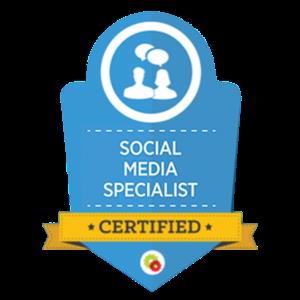
The distinction between content marketing and content strategy is subtle because the two concepts work together. Once you figure it out, you can use them as the one-two punch to help grow your brand.
This post explains content marketing and content strategy and gives advice for using both to benefit your business.
The Difference Between Content Marketing vs. Content Strategy
Content strategy is your master plan to drive business goals with content. It focuses on the big-picture tasks that help you meet your customers’ needs and achieve your business objectives.
Content marketing is a group of tactics or activities you use to enact your content strategy. It’s the creation and distribution of content that helps your audience solve problems and lead better lives. Even though you may not actively try to sell with all content marketing, the free information you provide will eventually help you attract and convert your target audience to drive business growth.
The objectives, approaches, and outcomes differ for content strategy vs. content marketing.
Objectives
Content strategy seeks to document the role content will play in your business goals. It gives content marketing efforts direction, cohesion, and meaning.
Content marketing revolves around creating brand awareness, generating leads, and capturing demand by transforming ideas into content assets and sharing them.
Approaches
Content marketing assembles your marketing resources to create and distribute content assets across relevant channels to build a brand’s presence. It also includes measuring data to alter content campaigns where necessary.

Content strategists determine the content marketing tactics will be most meaningful for your business objectives. They handle all the backend of content from pre-production (like research, content audit, and content guidelines) to production (like content creation, distribution processes, and tools) and post-production (promotion, evaluation, and analysis).
Outcomes
Content marketing leads to increased brand traffic, authority, trust, lead generation, conversion, and loyalty.
Content strategy produces content marketing systems that position a brand as the solution to customers’ needs.
How Content Strategy and Content Marketing Intersect
Despite being different, content strategy and content marketing work together. They are two sides of the same coin.
Strategy is the Foundation for Marketing Practices
Content strategy helps you decide why and how you want to create content. So, content marketing success depends on your strategy.
Content marketing is the process of putting your content strategy to work. It’s creating, distributing, and measuring the success of the content according to the content strategy. So, your content marketing efforts rely on your content strategy to achieve your business goals.
Neither Can Stand Alone
As marketing expert Amanda Milligan said, “Don’t try marketing without strategy; don’t bother strategizing without marketing.” What’s the point in making plans if you don’t implement them? And how can you succeed with your marketing efforts if you don’t have a plan? Strategy and implementation go hand in hand.

After Strategy, Marketing Begins
If content marketing is the act of preparing a meal, the content strategy would be all the decisions you make before the actual cooking. What are you going to cook? What ingredients will you use? Where will you cook it, and how will you serve it?
Once you determine what to do, when, where, and how to do it during content strategy, you can bring the vision to life in the form of content.
Benefits of Content Strategy
Content strategy is critical because it lays out your content game plan. Without strategy, you’re wasting time and effort producing content and hoping it works. So, it’s almost an accident if your content works well for your brand without strategy. Here are some other benefits of content strategy.
Creates a Unified Brand Voice
Your brand voice must be consistent across all your marketing channels if you want your brand to stand out in a crowded market. A good content strategy will make sure of it.
Studying your brand story, personality, and style guide will help you define a consistent voice for your content marketing team, so your brand doesn’t sound too inconsistent on any content channel.
Increases Efficiency
A documented strategy streamlines your content operations to keep you from wasting time and resources figuring things out. That’s because it puts systems in place to guide your production and distribution, allowing you to complete tasks faster and within budget.
Content marketing has so many moving parts that leaving anything to chance is a mistake. Your content strategy should state what the content is (title and format), who’s responsible for what, where to store your content, and where to publish it.

Maps a Clear Path to Success
A good content strategy defines what you’re trying to achieve and the metrics to track to measure success. When this is clear, you can prioritize your activities accordingly. And you can measure what’s working and what’s not to keep your content relevant to your audience and helpful to your business goals.
Establishes Content Intent
Creating content will waste your time and resources if you don’t have a purpose that ties it to your business goals. Each content asset should take a prospect further down your marketing funnel. Anything short of that is creating content for content’s sake, and the best you can get out of it will be vanity metrics that don’t help your business. Establishing a purpose for your content is the essence of content strategy.
Benefits of Content Marketing
Your customers don’t know when they see your content strategy in action, but they see your content marketing. It answers their questions and makes them consider doing business with you. Here are some other benefits of content marketing.
Drives Engagement
Customers engage with content they find valuable. The more content you share, the better your chances of keeping them on your platforms long enough to like, comment, and share your content with friends.
Increases Brand Awareness
By distributing valuable content, you’re making it easier for your target audience to find your brand and buy from you. Without brand awareness, people can’t even consider your products or services.

Builds a Relationship with Your Audience
If the information you share helps your audience live better, they’ll naturally grow fond of and want to continue using your brand. And because your value systems will shine through, the content you share and help you build stronger relationships with the right customers. As your relationship develops, these people will become advocates for your brand and recommend it to others.
Instills Credibility
Consumers and search engines will grow to trust you when your content demonstrates your thought leadership, expertise, and authority. Backlinks and mentions from other brands will also serve as a vote of confidence for your brand. Credibility attracts more positive attention to your brand.
Leads to Customer Acquisition
Turning your content marketing beneficiaries into customers is the goal. When they see how much value you’re giving away for free, they can only imagine how helpful you will be when they pay for your products or services. This value will increase their chances of becoming your customers.
If you don’t know where to start, look at the latest trends in content marketing and see if any are a good fit for your business.
Best Practices for Implementing Content Marketing and Content Strategy
There’s no one way to create and implement content strategy or marketing. Strategy depends on your business and its goals. Content marketing depends on your audience’s needs and your creativity. While there’s no one approach to either, there are best practices for each.

Gather Audience Information
Content-market fit is when your content satisfies or exceeds your audience’s needs. Every business wants this, but those who achieve it do so only because they know their audience well enough to tailor their content to their specific situations.
To create valuable content, you need to know the people you serve by:
- Demographics (age, education level, gender identity, education level, etc.)
- Psychographics (interests, beliefs, values, etc.)
- Goals and pain points
- Where they gather online
- What they’re trying to do when they go online (also known as search intent)
The more information you have, the better your ability to create an ideal profile or buyer persona to guide your marketing efforts. You really can’t know too much about your ideal audience.
To gather the most accurate audience data:
- Identify the people who need your products and services.
- Survey your current customers.
- Review your competitors’ clients.
- Use online data tools like Facebook audience insights or SEMRush.
Approaching every piece of content strategy or marketing effort with a clear picture of your ideal buyer in mind will help you tailor your content to their specific needs.
Set Clear Goals
Setting clear content goals helps you define what success means for your content marketing efforts. Apart from allowing you to align your actions toward success, setting clear goals also lets you measure the effects of your efforts.

Are You Ready to Master Social Media?
Become a Certified Social Media Specialist and learn the newest strategies (by social platform) to draw organic traffic to your social media sites.
For example, if you want to drive traffic to your website to increase brand awareness, analyzing the difference in your weekly or monthly website visits and what posts are bringing in the most traffic will help you measure the impact of your efforts. You can do more of what works.
Setting clear goals for your content marketing will enhance your goals for individual content assets.
To set clear, more achievable content goals:
- Understand the overall goals of the business and the part content can play in reaching them.
- Audit your content activities to understand how far you are from achieving those goals.
- Identify the resources you need to achieve those content goals.
- Put numbers and timeframes to your goals (e.g., increasing website traffic by 25% in the next year).
Develop Processes
Content marketing requires a sense of organization. Keyword research, content creation, and distribution are just a few of the routine tasks. You’ll need to create workflows to coordinate the many moving parts if you don’t want things to fall through the cracks.
Content calendars help marketers of all experience levels to coordinate their content operations. Creating one will make you more productive and efficient. If you’re looking for a place to start, there are a host of online tools to help, ranging from Google Sheets, where you build your own calendar, to Coschedule, where you use a template.
Create a content calendar by:
- Listing your content ideas
- Determining the content formats
- Documenting your publishing and distribution frequency to schedule the ideas
Create Quality Content
Quality content is your ticket to a successful content marketing campaign. Your audience is busy, so they’ll be more impatient with wishy-washy content. They won’t stick around long enough to buy from you or exchange their contact information if your content doesn’t draw them in.

To create content that resonates with your audience:
- Focus on Originality. Most of the content online is a bunch of recycled information. Original content approaches the topic in new and unique ways. Your content will stand out by researching an issue in your industry, sharing your personal experiences, or adding fresh insight to what exists.
- Repurpose Existing Content. Repurposing helps you maximize the value of the content you already created. For example, you can turn audio or video content into a blog post, social media posts, or an infographic. Repurposing helps your content work for you on multiple platforms.
- Leverage User-Generated Content (UGC). User-generated content is gathering customers’ feedback and reviews and sharing them with your audience. UGC resonates because other customers often regard the opinions of their peers above brand messages.
- Utilize Data and Analytics. Data helps you analyze audience behavior to better understand the type of content they want and need, how they want it, and when. Use analytics to inform your content decisions from strategy to post-publication.
- Be Flexible. Working with content means being ready to adjust your plans as often as necessary. Audiences and their needs change, so you must be ready to pivot with them.
Content Marketing vs. Content Strategy
Content Marketing and Content Strategy are connected, but they aren’t the same. You need content strategy as the blueprint to serve your customers and content marketing to execute your strategy. Using both well will help you build a well-oiled content engine that will serve your audience and your business now and for years to come.
[TAG8]The post Content Marketing vs. Content Strategy: What’s the Difference? appeared first on DigitalMarketer.
Frequently Asked Questions
What are five key factors that motivate entrepreneurs?
Motivation is the key ingredient to success. It is the key to success. We wouldn't exist without it.
Motivational psychology studies the behavior of people when they are motivated. When motivated, we do amazing things. There are limits to our motivation.
These are the five main motivating factors
- Autonomy – The freedom of choice
- Mastery is the ability to master skills
- Purpose – The sense of purpose
- Relatedness – The feeling that you are part of something larger
- Reciprocity: The desire to give something back
These motivators may be able to be applied to your company. You may feel that each of these motivators could be applied to your business. However, each offers a slightly unique perspective on why people act the same way.
An individual might want autonomy because he is able to make his own decisions. Perhaps he seeks mastery in order to excel at his job.
So on. These are only a few examples of motivations. There are many more. But which ones are relevant to your particular situation? All of that depends on you.
To find out, I recommend that you write down three words that describe your ideal workplace environment. These words can then be applied to your current working environment.
If you're having difficulty coming up with ideas then ask yourself, "Why do I do this?" The answer will help you identify your goals.
Once you know what you want, you can begin to figure out where you stand right now. That knowledge can help determine if you should change.
You don't have to change anything. It's time you evaluated your options.
You need to think about motivating yourself if you want to improve your life.
Which of these motivators is most effective? It's hard not to say. Instead of focusing solely on one factor instead, you should focus on all five.
This will help achieve your ultimate goal of being an entrepreneur.
What is your biggest motivation in life and why?
What is my favorite motivation in life? Let me tell it. Helping people feel better about their lives is what motivates me the most. To make them feel amazing because they are. They are worthy of love because they are.
They do deserve happiness.
To remind you, there is nothing more important that feeling good about yourself. Nothing. And I will do everything in my power to change the world.
Being happy with ourselves makes us more open-minded and compassionate towards our fellow humans. We stop judging each other based on superficiality and instead start seeing the person inside, which is really cool.
Showing someone that you already have everything you need is the best way for them to be motivated.
It may be something they didn't realize, but it's why they've been struggling for so long with something. Because they knew deep down within they had the power and ability to heal themselves.
They needed the right environment. The right support system. And the right mindset. They lost sight of this.
Why did they lose sight? Because they were too focused on figuring out the source of the problem. They tried to fix it as fast as possible, not realizing they had all the tools necessary to do so.
But they forgot that the real reason they weren't able to solve it was because they didn't even know they had the answer.
I'm here to remind that you have the power and ability to create a whole new world. All you have do is tap into your inner genius.
Everything will come together once you do this. You will be amazed at how simple it is to achieve your dreams.
You see, every person has their unique superpower.
Only we have to know how to use it.
How can entrepreneurs motivate staff?
Motivation can come from any source. Motivation can come from anywhere. Motivation is vital for any business.
A motivated employee is more likely to be productive and happy. For a team that performs well, provide them with the tools they need to feel empowered.
It is important to make sure they feel valued. They should feel encouraged to grow and learn. Where they can contribute ideas without fear of punishment.
It is important to create a culture within your company that encourages employees to flourish and be successful. This is how you keep your top talent happy, productive, and loyal.
You need to recognize the behaviors that make you successful in order to maintain a culture. This could include giving bonuses for reaching goals, offering training opportunities and providing perks, such as health insurance.
Also, you must communicate clearly with everyone. Make sure everyone is clear about what they are expected to do and why.
Make sure that your policies and procedures have been written down. Ensure that someone is responsible for ensuring they are followed.
Communication is key. Keep your employees informed about the current state of the organization. Let them know about the latest developments and plans.
Communication is crucial, and it is important to look after your team. They'll take care of you.
A bad relationship with employees could lead to big problems. Studies have shown that high employee engagement results in higher productivity and profitability for companies than those that struggle to retain top performers.
It's important that employees understand that they don't all want to work at the exact same pace. Some prefer working independently, while others like to collaborate. There are many motivational methods that can be used to motivate people. It's up you to choose the one that works best for you.
One example is that some people respond better to recognition, while others may prefer incentives. Whatever works best for you and your company, it must be consistent with the company's objectives.
As the leader, you are responsible for setting the tone. Be open-minded. Listen to your team. Don't forget to listen.
What are the advantages of an entrepreneurial mindset?
Entrepreneurship has many advantages. You become more independent. You can stop relying upon others.
This allows you to be your own boss and can allow you to follow your dreams. Because you have similar interests and challenges, it helps you to build relationships with other entrepreneurs.
You gain confidence. As an entrepreneur, you're always learning new things. This gives you the ability adapt quickly and to be flexible. By thinking outside the box, you will not be trapped in a rut.
Our freedom to create our businesses is free from the restrictions imposed by society. We're free and able to decide what we do and how much we live.
We can choose either to follow the crowds or go against them. We have the option to choose success or failure. We can choose to fail or win.
It's exhilarating to have freedom. However, it also comes with some responsibility. This is because you are accountable for everything happening within your company once you have taken on this role.
To succeed, you have to learn to manage risks. Don't be afraid trying new things. You can reach your goal if your willingness to learn from past mistakes
These are some of the lessons you should keep in mind when embarking on your journey.
Remember:
- Entrepreneurship is a lifestyle choice.
- If you own your own business, then you're the boss.
- Be cautious about following the trends.
- You don't measure success in money. It is in freedom.
- You need to balance your personal life with your professional life.
- Set clear expectations.
- Always be open with your team.
- Do something about it if you want things to happen.
What makes an entrepreneur a success?
There are two types, those who make their money and those whose time is theirs.
What makes them different is their approach to business. The difference between them is how they approach their business. Those who make more money are focused on making more money, while those who make more time are more focused on making more.
People who make money are motivated by financial freedom. Their goal is to be rich and remain rich.
They are motivated by fear and greed. They are motivated by fear and greed, but they don't think about the long-term.
This type is often called a hustler. They are focused on the bottom line and seek ways to increase revenue, without regard for quality.
Others make it a full-time job. These entrepreneurs are driven by passion. They want to create something that is meaningful and will last forever.
They are motivated by altruism. They want to do great works. They want to create products and services that are meaningful.
These people are sometimes called dreamers. They are driven by inspiration and vision. They know success requires perseverance, hard work and dedication.
However, the most important quality of these entrepreneurs? They are creative. These entrepreneurs are always searching for new opportunities.
They thrive on the unknown. They will spend hours researching any topic that interests them. Because they love learning new things, they are always open to trying new ideas.
They can also adapt easily to change. They are not afraid to get dirty and do whatever it takes in order to win. They will not tolerate mediocrity.
So which type of entrepreneur are you? Is it a burning desire to make a living or a burning desire to find meaning?
Congratulations if you answered yes both questions. You are an entrepreneur who is successful.
I have known many successful entrepreneurs over the years. One thing that unites them all is passion.
Success isn't measured by just monetary wealth. They leave behind an impact that defines them.
Steve Jobs, who was not rich but well-known for his philanthropic efforts, is an example. He didn’t even own his first home until he was in the mid-40s.
His wealth came from his ability to create products that changed the world. And this is what makes him unique.
It is not about accumulating wealth. It's not to build empires or amass power.
Your job is building relationships with customers or partners. To build trust. To support others.
To have a positive effect. That's your legacy. This is your legacy, not your bank accounts.
And if you're ready to start building a legacy that matters, let's talk.
Social Media University teaches you how passive income can be earned online. We will teach you how to market and grow your business.
Which 6 questions are most motivating for entrepreneurs?
Motivation is the main ingredient of any business. Motivation is essential for any business. Without it, it's difficult to get out of bed every day. You won't be able to complete projects if you don't have motivation. Motivation is essential for reaching your goals. How do we find our inspiration?
It is possible to ask yourself: "What motivates me?" You might be surprised at the answer. You might have been asking the same question for many years. This question is one of life's most rewarding rewards. It allows you to uncover your motivation.
There is nothing more motivating that discovering why you exist. When you discover what drives you, you can finally feel fulfilled. You will find your purpose clearer and more meaningful. What makes you care? When you figure that out, you'll find it much easier to stay motivated.
Look within to find your motivation. Ask yourself these questions:
- What are my passions?
- What makes my heart beat faster?
- What is it that lights me up?
- What gives me butterflies inside my stomach?
- What makes you feel alive?
- What makes you come back to your project again and again?
Once you know your answers you'll be in a position to identify your true motivations.
Your motivation can help you get through tough times. You will find strength whenever you need it. It will help you work harder. You will be motivated to achieve your goals.
If you're anything like me, you will never stop searching for your motivation.
Consider what drives you today. You just might be surprised at what you find.
Statistics
- Our 10 years of research also shows that 75% of mentored entrepreneurs increased their revenue, and 82% of their businesses survived the first two years. (carolroth.com)
- "If you improve by just 1% every single day, in several months, you will have improved by 100%. (carolroth.com)
- “Life is 10% what happens to you and 90% how you react to it.” (oberlo.com)
- According to analysts, Johnson has high appeal in all four quadrants tracked at the multiplex: male, female, over-25 and under-25. (forbes.com)
- Invest at least 30% managing those with authority over you and 15% managing your peers.” (americanexpress.com)
External Links
kabbage.com
due.com
twitter.com
inc.com
How To
What are five motivating factors for entrepreneurs?
Entrepreneurs want to be financially independent. They want to control their destiny. They also want to earn enough money to provide for themselves and their families.
They are motivated by the desire and need to help others. Many successful business owners are not motivated only by their personal gain but also for the greater good of others.
These are just a few of the motivations.
- Passion - Passion is the key to success. You can't have passion if you don’t like what you do.
- Vision - A vision can be described as a visual representation of the place you want to go. When we dream, we imagine ourselves there. Dreaming can make us feel fulfilled because we know that our dreams are possible.
- Courage - Don't fear failure, face it head-on. Failure is inevitable, but failure doesn't have to define you. While failure is inevitable, success is still possible if we keep going.
- Belief - Believe in yourself. Do not let doubt keep you from reaching your goals. Fear is often the cause of doubt. Fear keeps us stuck in our comfort zone. So break out of your comfort zone and move towards your goals.
- Persistence – Never stop trying, no matter what the odds may seem. Everyone makes mistakes. However, if perseverance is your key to success, you will achieve your goals.






